By Arthur Bradley · Wednesday, April 1, 2020 Arthur Bradley’s “Terrors of Theory: Critical Theory of Terror from Kojève to Žižek” appears in Telos 190 (Spring 2020): Economy and Ecology: Reconceiving the Human Relationship to Nature. Read the full article at the Telos Online website, or purchase a print copy of the issue in our online store. Individual subscriptions to Telos are available in both print and online formats.
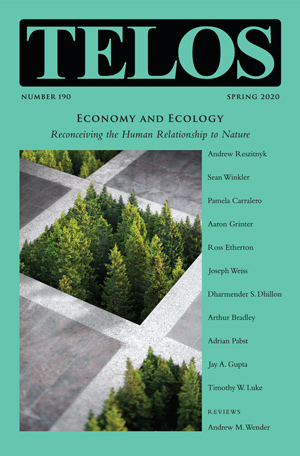 This essay seeks to offer a new genealogy of contemporary critical theory of terror from Alexandre Kojève to Slavoj Žižek. It is clear that critical theory’s response to the volatile post-9/11 geopolitical landscape takes many forms, but one of its most controversial tasks has been a reclamation of the fatal signifier “terror” itself for the radical Left. According to thinkers such as Žižek and Alain Badiou, we must redeem the emancipatory core of the Jacobin Terror from its “Thermodorean” betrayal by two centuries of political and economic liberalism. Yet my claim is that this critical attempt to recuperate terrorism can only be understood in the context of a much longer debate about the meaning of “terror” within twentieth-century European philosophy, which stretches back to Kojève’s lectures on Hegel in the 1930s. This essay tracks the evolution of critical theory of terror from Kojève’s political ontology of terror in his (famously or notoriously) idiosyncratic interpretation of the Hegelian master–slave dialectic to its contemporary conclusion in Žižek’s embrace of Jacobin terror. If Kojève’s lectures effectively introduced Hegel into twentieth-century European philosophy, I will argue that they were also the platform for a wave of neo-Hegelian reflections on the historical, political, and philosophical stakes of terror including, most importantly, Emmanuel Lévinas’s Time and the Other (1947) and Maurice Blanchot’s “Literature and the Right to Death” (1949). In conclusion, I contend that Žižek’s neo-Hegelian defense of the Jacobin leader Robespierre in recent works like In Defense of Lost Causes (2008) might, for better or worse, be read as the latest manifestation of this Kojèvean terrorist legacy. This essay seeks to offer a new genealogy of contemporary critical theory of terror from Alexandre Kojève to Slavoj Žižek. It is clear that critical theory’s response to the volatile post-9/11 geopolitical landscape takes many forms, but one of its most controversial tasks has been a reclamation of the fatal signifier “terror” itself for the radical Left. According to thinkers such as Žižek and Alain Badiou, we must redeem the emancipatory core of the Jacobin Terror from its “Thermodorean” betrayal by two centuries of political and economic liberalism. Yet my claim is that this critical attempt to recuperate terrorism can only be understood in the context of a much longer debate about the meaning of “terror” within twentieth-century European philosophy, which stretches back to Kojève’s lectures on Hegel in the 1930s. This essay tracks the evolution of critical theory of terror from Kojève’s political ontology of terror in his (famously or notoriously) idiosyncratic interpretation of the Hegelian master–slave dialectic to its contemporary conclusion in Žižek’s embrace of Jacobin terror. If Kojève’s lectures effectively introduced Hegel into twentieth-century European philosophy, I will argue that they were also the platform for a wave of neo-Hegelian reflections on the historical, political, and philosophical stakes of terror including, most importantly, Emmanuel Lévinas’s Time and the Other (1947) and Maurice Blanchot’s “Literature and the Right to Death” (1949). In conclusion, I contend that Žižek’s neo-Hegelian defense of the Jacobin leader Robespierre in recent works like In Defense of Lost Causes (2008) might, for better or worse, be read as the latest manifestation of this Kojèvean terrorist legacy.
Continue reading →
By David Pan · Monday, March 16, 2020 Telos 190 (Spring 2020): Economy and Ecology: Reconceiving the Human Relationship to Nature is now available for purchase in our store. Individual subscriptions to Telos are also available in both print and online formats.
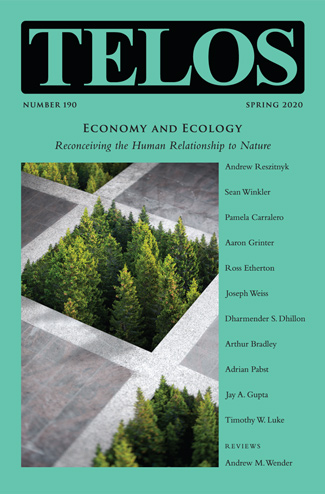 Our human relationship to nature defines our economic life. As Marx articulated in the 1844 manuscripts, labor involves an engagement with nature in order to fulfill human ends, the working up of nature as an “inorganic body.” Consequently, the world of work and that of the environment are really two aspects of our relationship to nature, and the shift in academic interest from economy to ecology as the burning issue of the day does not represent any real change in perspective. On a fundamental level, economy is ecology and vice versa. Thus, the issue of climate change is primarily one about the energy structure of our economy. If that structure before the Industrial Revolution boiled down to the way in which we were cutting down our forests, today the issue is how fossil fuels are leading to climate change. The other global natural disaster of our day, the coronavirus, has arisen as a consequence, first, of our treatment of wild animals as food and, second, of economic globalization, whose movements have established the pathways for the rapid spread of viruses. Our human relationship to nature defines our economic life. As Marx articulated in the 1844 manuscripts, labor involves an engagement with nature in order to fulfill human ends, the working up of nature as an “inorganic body.” Consequently, the world of work and that of the environment are really two aspects of our relationship to nature, and the shift in academic interest from economy to ecology as the burning issue of the day does not represent any real change in perspective. On a fundamental level, economy is ecology and vice versa. Thus, the issue of climate change is primarily one about the energy structure of our economy. If that structure before the Industrial Revolution boiled down to the way in which we were cutting down our forests, today the issue is how fossil fuels are leading to climate change. The other global natural disaster of our day, the coronavirus, has arisen as a consequence, first, of our treatment of wild animals as food and, second, of economic globalization, whose movements have established the pathways for the rapid spread of viruses.
Continue reading →
By Lewis West · Friday, March 13, 2015 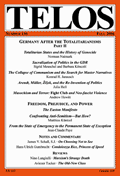 Catastrophic history does not free society: it allows the individual no exit from an endless spiral of destruction. Such destruction promises liberation for some, but it only tilts the world closer to ever-greater annihilation. To place one’s hope in redemptive violence constitutes a leap into the absurd. It is an act of pure faith. This is how Julia Hell, in her essay “Remnants of Totalitarianism: Hannah Arendt, Heiner Müller, Slavoj Žižek, and the Re-Invention of Politics,” reads the apocalyptic politics of Müller and Žižek. Hell frames her critique with a rigorous practicality: she laments Žižek’s “empty terms,” and likewise she sees the political writings of Giorgio Agamben and Judith Butler as hopelessly vague (103). Yet Hell’s rejection of Müller and Žižek does not reflect an entirely pragmatic method. While Hell insists on the need for a usable, specific politics, her attentive readings of each thinker also point to a vast philosophical disagreement. In the end, the true debate is not over the applications of theory. It is instead over the answer to a single question: what is the relationship of politics to death? Catastrophic history does not free society: it allows the individual no exit from an endless spiral of destruction. Such destruction promises liberation for some, but it only tilts the world closer to ever-greater annihilation. To place one’s hope in redemptive violence constitutes a leap into the absurd. It is an act of pure faith. This is how Julia Hell, in her essay “Remnants of Totalitarianism: Hannah Arendt, Heiner Müller, Slavoj Žižek, and the Re-Invention of Politics,” reads the apocalyptic politics of Müller and Žižek. Hell frames her critique with a rigorous practicality: she laments Žižek’s “empty terms,” and likewise she sees the political writings of Giorgio Agamben and Judith Butler as hopelessly vague (103). Yet Hell’s rejection of Müller and Žižek does not reflect an entirely pragmatic method. While Hell insists on the need for a usable, specific politics, her attentive readings of each thinker also point to a vast philosophical disagreement. In the end, the true debate is not over the applications of theory. It is instead over the answer to a single question: what is the relationship of politics to death?
Continue reading →
By Joseph van der Naald · Tuesday, November 18, 2014 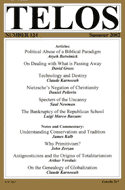 Is humanity’s need to control nature ultimately working against us? Are the modern ecological crises we face today the inevitable result of the accelerating technologization of society? Can we conclude that what appears to be widespread anomie, as evidenced, for example, by the now almost monthly school shootings in the United States, and the genocidal totalitarian regimes of the twentieth century both have their “premises, dynamics, or preconditions” (169) in industrialization’s alienation of mankind from nature? In “Why Primitivism?” John Zerzan hopes to convince us that the answers to these questions are yes. Through a nuanced critique of both modernity and the thoughts of the twentieth and twenty-first centuries’ canonized intellectual Left, Zerzan draws the conclusion that we should look far back into human pre-history to find solutions to the problems that face humanity in the present. In this post, I will explore the primitivist position and provide a critique of Zerzan’s thought using Slavoj Žižek’s explorations into ecology’s ideological character. Is humanity’s need to control nature ultimately working against us? Are the modern ecological crises we face today the inevitable result of the accelerating technologization of society? Can we conclude that what appears to be widespread anomie, as evidenced, for example, by the now almost monthly school shootings in the United States, and the genocidal totalitarian regimes of the twentieth century both have their “premises, dynamics, or preconditions” (169) in industrialization’s alienation of mankind from nature? In “Why Primitivism?” John Zerzan hopes to convince us that the answers to these questions are yes. Through a nuanced critique of both modernity and the thoughts of the twentieth and twenty-first centuries’ canonized intellectual Left, Zerzan draws the conclusion that we should look far back into human pre-history to find solutions to the problems that face humanity in the present. In this post, I will explore the primitivist position and provide a critique of Zerzan’s thought using Slavoj Žižek’s explorations into ecology’s ideological character.
Continue reading →
By Giuseppe Tassone · Thursday, April 24, 2014 Giuseppe Tassone’s “Wicked Men, Evil World: Evil between Psychoanalysis and Historical Materialism” appears in Telos 166 (Spring 2014). Read the full version online at the Telos Online website, or purchase a print copy of the issue in our store.
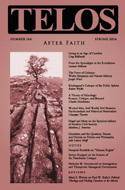 Slavoj Žižek and Terry Eagleton have recently deployed the neo-Lacanian appropriation of Kant’s notion of radical evil in favor of an emancipatory politics of terror. For Žižek, there is a “progressive” passion for the Real that is aimed at universal justice. Similarly, Eagleton insists that there is a “good” will to nothingness that, if embodied by the wretched of the earth—that is, the victims of global capitalism—can lead to a radical transformation of society. In this article, I argue that Žižek’s and Eagleton’s accounts of terror are problematic as long as they are based on the assumption that there is a fundamental ontological flaw in human will to which the most intractable horrors of history are to be traced down. Following Adorno, I contend that evil is a social category or, in Adornian terms, an expression of the oppressive totality of which individuals as such are not responsible, and that, in the rationalized society of late capitalism, evil individuals such as Iago and Richard III have become impossible. Slavoj Žižek and Terry Eagleton have recently deployed the neo-Lacanian appropriation of Kant’s notion of radical evil in favor of an emancipatory politics of terror. For Žižek, there is a “progressive” passion for the Real that is aimed at universal justice. Similarly, Eagleton insists that there is a “good” will to nothingness that, if embodied by the wretched of the earth—that is, the victims of global capitalism—can lead to a radical transformation of society. In this article, I argue that Žižek’s and Eagleton’s accounts of terror are problematic as long as they are based on the assumption that there is a fundamental ontological flaw in human will to which the most intractable horrors of history are to be traced down. Following Adorno, I contend that evil is a social category or, in Adornian terms, an expression of the oppressive totality of which individuals as such are not responsible, and that, in the rationalized society of late capitalism, evil individuals such as Iago and Richard III have become impossible.
Continue reading →
Kevin S. Amidon and Zachary Gray Sanderson’s “On Subjectivity and the Risk Pool; or, Žižek’s Lacuna” appears in Telos 160 (Fall 2012). Read the full version online at the Telos Online website, or purchase a print copy of the issue here.
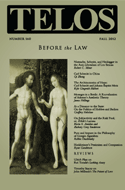 In his In Defense of Lost Causes, Slavoj Žižek poses more than a few heavy-gauge questions. Foremost among them: “The only true question today is: do we endorse this ‘naturalization’ of capitalism, or does contemporary global capitalism contain antagonisms which are sufficiently strong to prevent its infinite reproduction?” Žižek’s analysis of this question, however, seems to us to be missing a crucial element. Where Žižek seems to posit a kind of reconvergence of the classical autonomous subject of the (neo-)liberal (and Frankfurt School) traditions with the class-based vocabulary of more radical Marxist and Lacanian analyses, we see another layer: the subject under the condition of the risk pool. The risk pool, protean and ubiquitous in today’s political economy, takes form in those meta-structures of institutionalized financial, political, and medical (i.e. bio-political) insurance and quasi-insurance that do not so much control the subject’s spheres of activity as regulate them. The (voluntarily or involuntarily) risk-pooled human being is thus in many ways neither subject nor class. She is always both, and navigating always between them in the sphere of financially and actuarially mediated risk. Such navigation in many ways evacuates the forms of political agency posited in both liberal and Marxist traditions, and focuses the individual centrally on the problem of uncertainty. Žižek’s complex analyses of topics as diverse as terrorism and Christianity approach reflections like these, but end where they must in fact begin. In his In Defense of Lost Causes, Slavoj Žižek poses more than a few heavy-gauge questions. Foremost among them: “The only true question today is: do we endorse this ‘naturalization’ of capitalism, or does contemporary global capitalism contain antagonisms which are sufficiently strong to prevent its infinite reproduction?” Žižek’s analysis of this question, however, seems to us to be missing a crucial element. Where Žižek seems to posit a kind of reconvergence of the classical autonomous subject of the (neo-)liberal (and Frankfurt School) traditions with the class-based vocabulary of more radical Marxist and Lacanian analyses, we see another layer: the subject under the condition of the risk pool. The risk pool, protean and ubiquitous in today’s political economy, takes form in those meta-structures of institutionalized financial, political, and medical (i.e. bio-political) insurance and quasi-insurance that do not so much control the subject’s spheres of activity as regulate them. The (voluntarily or involuntarily) risk-pooled human being is thus in many ways neither subject nor class. She is always both, and navigating always between them in the sphere of financially and actuarially mediated risk. Such navigation in many ways evacuates the forms of political agency posited in both liberal and Marxist traditions, and focuses the individual centrally on the problem of uncertainty. Žižek’s complex analyses of topics as diverse as terrorism and Christianity approach reflections like these, but end where they must in fact begin.
Continue reading →
|
|
 This essay seeks to offer a new genealogy of contemporary critical theory of terror from Alexandre Kojève to Slavoj Žižek. It is clear that critical theory’s response to the volatile post-9/11 geopolitical landscape takes many forms, but one of its most controversial tasks has been a reclamation of the fatal signifier “terror” itself for the radical Left. According to thinkers such as Žižek and Alain Badiou, we must redeem the emancipatory core of the Jacobin Terror from its “Thermodorean” betrayal by two centuries of political and economic liberalism. Yet my claim is that this critical attempt to recuperate terrorism can only be understood in the context of a much longer debate about the meaning of “terror” within twentieth-century European philosophy, which stretches back to Kojève’s lectures on Hegel in the 1930s. This essay tracks the evolution of critical theory of terror from Kojève’s political ontology of terror in his (famously or notoriously) idiosyncratic interpretation of the Hegelian master–slave dialectic to its contemporary conclusion in Žižek’s embrace of Jacobin terror. If Kojève’s lectures effectively introduced Hegel into twentieth-century European philosophy, I will argue that they were also the platform for a wave of neo-Hegelian reflections on the historical, political, and philosophical stakes of terror including, most importantly, Emmanuel Lévinas’s Time and the Other (1947) and Maurice Blanchot’s “Literature and the Right to Death” (1949). In conclusion, I contend that Žižek’s neo-Hegelian defense of the Jacobin leader Robespierre in recent works like In Defense of Lost Causes (2008) might, for better or worse, be read as the latest manifestation of this Kojèvean terrorist legacy.
This essay seeks to offer a new genealogy of contemporary critical theory of terror from Alexandre Kojève to Slavoj Žižek. It is clear that critical theory’s response to the volatile post-9/11 geopolitical landscape takes many forms, but one of its most controversial tasks has been a reclamation of the fatal signifier “terror” itself for the radical Left. According to thinkers such as Žižek and Alain Badiou, we must redeem the emancipatory core of the Jacobin Terror from its “Thermodorean” betrayal by two centuries of political and economic liberalism. Yet my claim is that this critical attempt to recuperate terrorism can only be understood in the context of a much longer debate about the meaning of “terror” within twentieth-century European philosophy, which stretches back to Kojève’s lectures on Hegel in the 1930s. This essay tracks the evolution of critical theory of terror from Kojève’s political ontology of terror in his (famously or notoriously) idiosyncratic interpretation of the Hegelian master–slave dialectic to its contemporary conclusion in Žižek’s embrace of Jacobin terror. If Kojève’s lectures effectively introduced Hegel into twentieth-century European philosophy, I will argue that they were also the platform for a wave of neo-Hegelian reflections on the historical, political, and philosophical stakes of terror including, most importantly, Emmanuel Lévinas’s Time and the Other (1947) and Maurice Blanchot’s “Literature and the Right to Death” (1949). In conclusion, I contend that Žižek’s neo-Hegelian defense of the Jacobin leader Robespierre in recent works like In Defense of Lost Causes (2008) might, for better or worse, be read as the latest manifestation of this Kojèvean terrorist legacy. 
 Catastrophic history does not free society: it allows the individual no exit from an endless spiral of destruction. Such destruction promises liberation for some, but it only tilts the world closer to ever-greater annihilation. To place one’s hope in redemptive violence constitutes a leap into the absurd. It is an act of pure faith. This is how Julia Hell, in her essay “Remnants of Totalitarianism: Hannah Arendt, Heiner Müller, Slavoj Žižek, and the Re-Invention of Politics,” reads the apocalyptic politics of Müller and Žižek. Hell frames her critique with a rigorous practicality: she laments Žižek’s “empty terms,” and likewise she sees the political writings of Giorgio Agamben and Judith Butler as hopelessly vague (103). Yet Hell’s rejection of Müller and Žižek does not reflect an entirely pragmatic method. While Hell insists on the need for a usable, specific politics, her attentive readings of each thinker also point to a vast philosophical disagreement. In the end, the true debate is not over the applications of theory. It is instead over the answer to a single question: what is the relationship of politics to death?
Catastrophic history does not free society: it allows the individual no exit from an endless spiral of destruction. Such destruction promises liberation for some, but it only tilts the world closer to ever-greater annihilation. To place one’s hope in redemptive violence constitutes a leap into the absurd. It is an act of pure faith. This is how Julia Hell, in her essay “Remnants of Totalitarianism: Hannah Arendt, Heiner Müller, Slavoj Žižek, and the Re-Invention of Politics,” reads the apocalyptic politics of Müller and Žižek. Hell frames her critique with a rigorous practicality: she laments Žižek’s “empty terms,” and likewise she sees the political writings of Giorgio Agamben and Judith Butler as hopelessly vague (103). Yet Hell’s rejection of Müller and Žižek does not reflect an entirely pragmatic method. While Hell insists on the need for a usable, specific politics, her attentive readings of each thinker also point to a vast philosophical disagreement. In the end, the true debate is not over the applications of theory. It is instead over the answer to a single question: what is the relationship of politics to death?  Is humanity’s need to control nature ultimately working against us? Are the modern ecological crises we face today the inevitable result of the accelerating technologization of society? Can we conclude that what appears to be widespread anomie, as evidenced, for example, by the now almost monthly school shootings in the United States, and the genocidal totalitarian regimes of the twentieth century both have their “premises, dynamics, or preconditions” (169) in industrialization’s alienation of mankind from nature? In “Why Primitivism?” John Zerzan hopes to convince us that the answers to these questions are yes. Through a nuanced critique of both modernity and the thoughts of the twentieth and twenty-first centuries’ canonized intellectual Left, Zerzan draws the conclusion that we should look far back into human pre-history to find solutions to the problems that face humanity in the present. In this post, I will explore the primitivist position and provide a critique of Zerzan’s thought using Slavoj Žižek’s explorations into ecology’s ideological character.
Is humanity’s need to control nature ultimately working against us? Are the modern ecological crises we face today the inevitable result of the accelerating technologization of society? Can we conclude that what appears to be widespread anomie, as evidenced, for example, by the now almost monthly school shootings in the United States, and the genocidal totalitarian regimes of the twentieth century both have their “premises, dynamics, or preconditions” (169) in industrialization’s alienation of mankind from nature? In “Why Primitivism?” John Zerzan hopes to convince us that the answers to these questions are yes. Through a nuanced critique of both modernity and the thoughts of the twentieth and twenty-first centuries’ canonized intellectual Left, Zerzan draws the conclusion that we should look far back into human pre-history to find solutions to the problems that face humanity in the present. In this post, I will explore the primitivist position and provide a critique of Zerzan’s thought using Slavoj Žižek’s explorations into ecology’s ideological character.  Slavoj Žižek and Terry Eagleton have recently deployed the neo-Lacanian appropriation of Kant’s notion of radical evil in favor of an emancipatory politics of terror. For Žižek, there is a “progressive” passion for the Real that is aimed at universal justice. Similarly, Eagleton insists that there is a “good” will to nothingness that, if embodied by the wretched of the earth—that is, the victims of global capitalism—can lead to a radical transformation of society. In this article, I argue that Žižek’s and Eagleton’s accounts of terror are problematic as long as they are based on the assumption that there is a fundamental ontological flaw in human will to which the most intractable horrors of history are to be traced down. Following Adorno, I contend that evil is a social category or, in Adornian terms, an expression of the oppressive totality of which individuals as such are not responsible, and that, in the rationalized society of late capitalism, evil individuals such as Iago and Richard III have become impossible.
Slavoj Žižek and Terry Eagleton have recently deployed the neo-Lacanian appropriation of Kant’s notion of radical evil in favor of an emancipatory politics of terror. For Žižek, there is a “progressive” passion for the Real that is aimed at universal justice. Similarly, Eagleton insists that there is a “good” will to nothingness that, if embodied by the wretched of the earth—that is, the victims of global capitalism—can lead to a radical transformation of society. In this article, I argue that Žižek’s and Eagleton’s accounts of terror are problematic as long as they are based on the assumption that there is a fundamental ontological flaw in human will to which the most intractable horrors of history are to be traced down. Following Adorno, I contend that evil is a social category or, in Adornian terms, an expression of the oppressive totality of which individuals as such are not responsible, and that, in the rationalized society of late capitalism, evil individuals such as Iago and Richard III have become impossible.  In his In Defense of Lost Causes, Slavoj Žižek poses more than a few heavy-gauge questions. Foremost among them: “The only true question today is: do we endorse this ‘naturalization’ of capitalism, or does contemporary global capitalism contain antagonisms which are sufficiently strong to prevent its infinite reproduction?” Žižek’s analysis of this question, however, seems to us to be missing a crucial element. Where Žižek seems to posit a kind of reconvergence of the classical autonomous subject of the (neo-)liberal (and Frankfurt School) traditions with the class-based vocabulary of more radical Marxist and Lacanian analyses, we see another layer: the subject under the condition of the risk pool. The risk pool, protean and ubiquitous in today’s political economy, takes form in those meta-structures of institutionalized financial, political, and medical (i.e. bio-political) insurance and quasi-insurance that do not so much control the subject’s spheres of activity as regulate them. The (voluntarily or involuntarily) risk-pooled human being is thus in many ways neither subject nor class. She is always both, and navigating always between them in the sphere of financially and actuarially mediated risk. Such navigation in many ways evacuates the forms of political agency posited in both liberal and Marxist traditions, and focuses the individual centrally on the problem of uncertainty. Žižek’s complex analyses of topics as diverse as terrorism and Christianity approach reflections like these, but end where they must in fact begin.
In his In Defense of Lost Causes, Slavoj Žižek poses more than a few heavy-gauge questions. Foremost among them: “The only true question today is: do we endorse this ‘naturalization’ of capitalism, or does contemporary global capitalism contain antagonisms which are sufficiently strong to prevent its infinite reproduction?” Žižek’s analysis of this question, however, seems to us to be missing a crucial element. Where Žižek seems to posit a kind of reconvergence of the classical autonomous subject of the (neo-)liberal (and Frankfurt School) traditions with the class-based vocabulary of more radical Marxist and Lacanian analyses, we see another layer: the subject under the condition of the risk pool. The risk pool, protean and ubiquitous in today’s political economy, takes form in those meta-structures of institutionalized financial, political, and medical (i.e. bio-political) insurance and quasi-insurance that do not so much control the subject’s spheres of activity as regulate them. The (voluntarily or involuntarily) risk-pooled human being is thus in many ways neither subject nor class. She is always both, and navigating always between them in the sphere of financially and actuarially mediated risk. Such navigation in many ways evacuates the forms of political agency posited in both liberal and Marxist traditions, and focuses the individual centrally on the problem of uncertainty. Žižek’s complex analyses of topics as diverse as terrorism and Christianity approach reflections like these, but end where they must in fact begin. 






